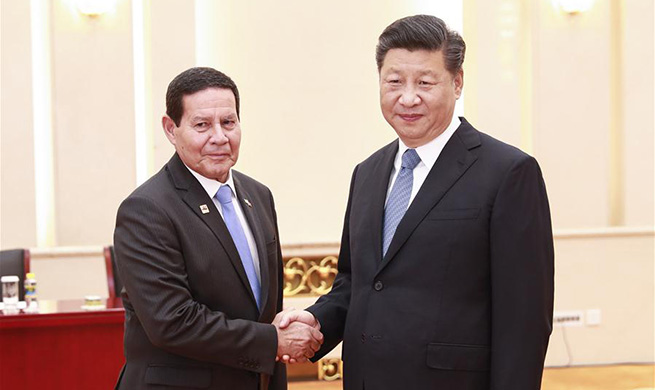KAMPALA, May 24 (Xinhua) -- Resource-dependent African economies must diversify if they are to rev up economic growth, the International Monetary Fund (IMF) has said in a new report.
The IMF Regional Economic Outlook for Sub Saharan Africa launched here earlier this week by Mira Clara, the organization's resident representative showed that although the continent's economic growth is on an upward trajectory, it varies considerably among countries.
It showed that recent and prospective growth performance is split between resource and non-resource-intensive countries.
The more diversified economies, 21 out of 45 economies, continue to grow at over 5 percent while growth remains anemic in more resource-dependent economies, which are home to more than half the population in sub-Saharan Africa.
Growth in resource-intensive countries was adversely impacted by the large 2014 terms-of-trade shock, which led to fall in commodity prices.
The region's larger economies also registered slower growth, according to the Outlook. In South Africa, lower private investment is contributing to slower growth with GDP growth expected to reach only 1.2 percent in 2019 while in Nigeria, the drop in oil prices and ongoing adjustment are expected to slow growth to 2.1 percent. In oil rich Angola, growth is projected at 0.4 percent in 2019.
Clara said African governments can take up several policy recommendations like facilitating greater private investments, raising productivity including promoting diversification and export competitiveness. Governments can also reduce non-tariff barriers and promote intra-regional trade.
Louis Kasekende, deputy governor of Uganda's central bank, Bank of Uganda said the Outlook presents both the good and bad sides.
He said the report, on a positive note shows there are African countries on a recovery path with rising income per capita. Some of these countries are resource-rich while the majority are resource-poor countries.
"Growth is strong in non-resource intensive countries. This means these countries have found other anchors for growth beyond mineral resources. Also fiscal policies have been supportive of growth and stability especially in resource-poor countries," Kasekende said.
"We need fiscal policy to remain prudent otherwise we risk reversing all the gains made. In addition, we have reduced conflicts in the region, providing a conducive environment for trade and other economic activities. Peace and stability must be preserved at all times and perhaps at all costs." Kasekende said.
On the flipside, Kasekende said Africa is still challenged by diversification and dependence on primary commodities that are subject to high volatility in prices.
"This is an indication that we have failed to get a very good anchor for sustainable high growth rates and there is minimal structural transformation, the sort of change that underpinned the development of the Asian Tigers," Kasekende said.
He said large economies like Angola, Nigeria and South Africa are expected to be more sophisticated and growth-supportive of their relatively smaller neighbors.
"If the large entities that are expected to anchor regional trade aren't faring well, then the benefits of regional integration may be severely impacted." he said.
He said what is worrying is that the recovery looks marginal and the job creation is weak, meaning there is a substantial threat to stability. The risk to civil strife within countries is high, he noted.













